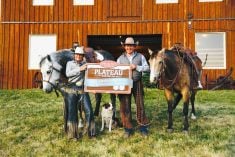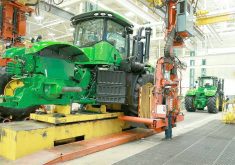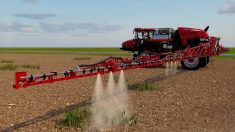In the Australian play entitled “Kick Off Ya Boots”, the actors and characters are farmers who talk about the farm with love and humour while finding their own path within their own fence lines.
One deeply moving scene starts with farmer Harry:
“Sometimes it’s like I’m driving a truckload of cattle down a road. And behind me all I can hear is all of them bellowing, telling me to go different directions. And some of them are yelling lies, or abusing me, or saying what an idiot I am. And the more I hear it, the more I stew on it and the more I believe it.”
Read Also

Pragmatism prevails for farmers in Canada-China trade talks
Canada’s trade concessions from China a good news story for Canadian farmers, even if the U.S. Trump administration may not like it.
His reflection is followed by a beautiful parody of “Let it Be”, in which Harry confesses the constant battle he feels he is in, just to live a happy life. He speaks of his feelings of failure and the taunting of his thoughts that churn up worries about what people say about him.
Harry is reassured by a new friend, Vicki, who listens without offering solutions. However, she encourages him to consider that spiteful words and even negative thoughts are like bullies, and that while we need to honour our feelings and hear the words, it is quite OK to walk away and let them be.
I was deeply moved by this particular scene in the middle of an uplifting rural production that touched on important issues with both grace and a lot of humour.
These are common challenges that we can connect with because every family lives with the trials of communication, balance and overall health. Farming families often also reside on the same property and the children may stare succession in the face every day, waiting and longing for the future to start. The stresses can be complex.
As I reflected on these complexities and the lives portrayed in this production, I considered that perhaps in our approach to the issues on the farm, we have taken the linear road of expectation. We expect a meeting with results, for example. How, then, can we allow for those experiencing pain to express themselves in their own place and space with dignity?
The arts offer a pathway to situation acknowledgement that is personal and preserves individual dignity. A poem, play or painting will have diverse meanings to different people. Each person takes away from the art form what it is that they feel.
It allows individuals to process their feelings in private while surrounded by community, all of whom truly desire to celebrate the farming life.
Most farmers in the First World chose agriculture as their life’s work and the farm as the place to raise a family and build community.
Playwright and farmer John Gladigau explains: “Mental health is one of the biggest issues in Australian rural communities, yet most initiatives created to address the challenge are created and driven outside our local community rather than from grassroots.”
As the scene with Harry closes, he comes to acknowledge on his own that worry and misery will not help and he finds the acceptance and courage to hear the words and then set them free.
If we want to normalize this kind of conversation so folks can reach their greatest potential and see the beauty in the life they chose, we have to preserve the dignity of each person in the process.
The arts are a pathway to achieve this, even though agriculture has traditionally not engaged in the arts.















